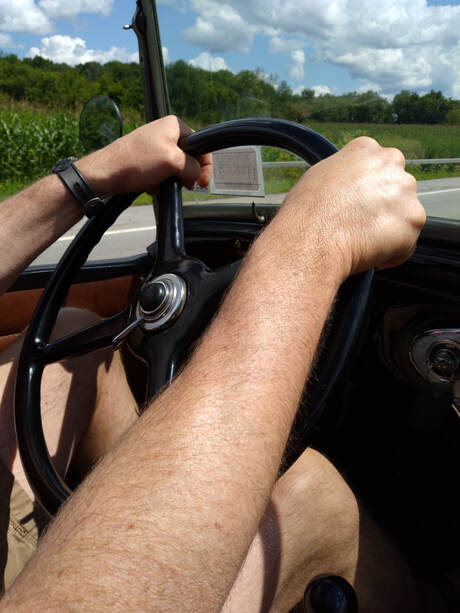 Rebellion Against Efficiency in a 1931 Model A Ford. Last week, my husband and I drove from my hometown, Eden, NY (an hour west of Buffalo) to Boston, MA in a 1931 Model A Ford Roadster. We celebrated this trip as a joyful rebellion against efficiency. But before I tell you about it, there are a few colliding stories and realities you must first understand. Story One: Ellie The Story of Ellie begins on a cold spring morning when my overly enthusiastic father told us he had just bought a new car-- a 1931 Model A Ford. It was going to be a “Driver” he repeated over and over again to anyone who would listen. I finally had the good sense to ask him just what he meant by driver. “This is not a fussy car,” he explained. “You can all drive her.” No one ever called Ellie “it,” and this was too long ago for her to be “they”. She was always a she. 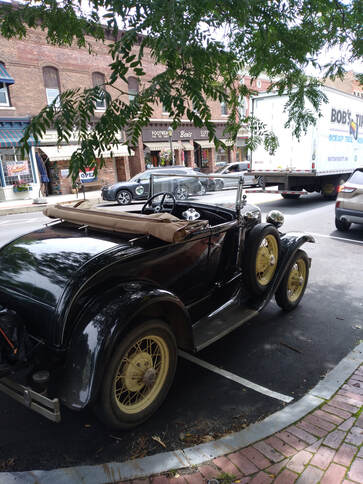 My paternal grandfather loved old cars. He owned a fleet of them. And they were fussy. You would not dream of eating in them or going out for ice cream in them. They were not fun. They were museum pieces. In general, I thought my grandfather’s old cars were boring; I preferred my maternal grandmother’s new Buick. Like my grandfather, my father loves old cars. In fact he loves all moving vehicles, sentimentally attached to each one. Our barn sheltered more motorcycles and antique cars than farm equipment. When my grandfather died, my father kept his car collection, unable to part with it. Yet on that spring morning, when my father handed over a check to Bill Magavern for a Model A Ford, somehow things were different. She was a driver. And she had a horn that squawked, “A-woooo-gaah!” Not long after my father ordered vanity plates for Ellie that made clear her purpose: 31DRIVER. Soon Ellie became the car we packed into (three kids could easily fit in the rumble seat) for ice cream, the car we drove to the swimming hole, and the car that by the age of 13 I was driving on back roads. Ellie was the first car I drove. I even taught my cousin how to drive a stick on Ellie. We would cruise up our driveway, cut over to the barn, drive down the gas well road, go off-road over a small grassy field, ride along an old dirt road that led to a railroad bridge, then back again, repeat, and repeat, enamoured with our newfound freedom, oblivious to the fact that we were going nowhere. I even drove Ellie to a summer job when I was finally 16 and legal, let off the dirt road. But why the name Ellie? I couldn’t tell you. I vividly remember choosing her name and declaring it to my father so he would stop calling her DRIVER which seemed much too clunky for such a great girl. I knew immediately that she identified as a woman. She told me. Does this sound ridiculous? Perhaps. Yet I have always named my cars. They take on a personality of their own. And since I named her, she has never been referred to as the other cars in John Henrich’s fleet as “The 35 Cabriolet”, or “The Packard,” “The 6.9,” or “The Jeep.” Instead, Ellie has always been Ellie. She carries her name proudly. 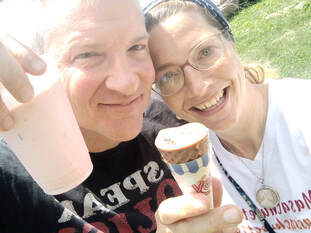 Story Two: That Thing Called Covid and General Work-Life Exhaustion Not sure if you have heard, but we’ve been living through a pandemic for a long long long ass time. Remember when we thought it was only going to be a few weeks? I have been a pastor for 20 years, and with any career, 20 years is a long time. For some reason, the weight of the pastorate has settled unevenly on me this summer and I have been unable to find a balance. I have felt too tired, too overwhelmed. Maybe it is the combination of the pandemic and 20 years in ministry. Most folks I talk to are feeling the same. Jon Paul has been chair of the faculty senate at his college during the pandemic. During this time all classes moved online, professors were retrained, pay was cut, sabbaticals were cancelled, students became troubled, and professors moved close to the edge.Jon Paul loves his students. He loves teaching. He hates teaching online. Sounds about right, doesn’t it? Who loves sitting in front of a Zoom screen? To top it off, Jon Paul’s father died this year. You get the picture. Like most of the world, we have been feeling unbalanced in an unbalanced world. We were exhausted and burnt out, we craved a break, but how and where? Jon Paul hatched a plan: we would drive Ellie from my parents to our home outside of Boston. “A Date” he kept calling it with an enthusiasm reminiscent of my Dad’s mantra, “She’s a Driver!”  The Trip: A Rebellion Against Efficiency Besides a horse drawn carriage, traveling across New York State and Massachusetts in Ellie is about as slow as can be. We could not travel on the ever efficient New York State Thruway or Mass Pike; Ellie’s best cruising speed is 45mph. Both state highways are the result of the Interstate Highway System constructed under Dwight Eisenhower to increase the efficiency of travel and transportation. The Interstate Highway System also transformed the way we traveled. When my mother drove from Buffalo to NYC to visit her grandparents, her family (mom, her three siblings, dog, paternal grandmother, and of course her parents, all in one car) drove along Rt 20 from town to town to town. As a result of the Interstate Highway System, we now bypass all of these towns and the different scenery and cultures that accompany them. The highway system, although highly efficient, disconnects the traveler from the very communities that make up a state. On our Ellie trip, Jon Paul and I traveled mostly along Rt 20. , And since we moved from town to town, we discovered and observed things we would not have otherwise. For example, do you know what Riggie is? We had to look it up after we saw it advertised as Thursday’s special on a restaurant sign. Riggie is a “Utica Thing”-- a pasta dish consisting of a tomato-sherry sauce with chicken. We bought a jar of the sauce to try. And did you know that German Lutherans traveled up from the Hudson Valley into the Mohawk Valley long before the Revolutionary War? Neither did we, until we discovered a German Lutheran Church built in the 1700s. We also discovered that the Mohawk Valley, once a thriving industrial center nicknamed the “gateway to the west”, has been gutted by economic collapse and ravaged by poverty. We discovered something else we did not expect: people of color love old cars! Without question, more people of color waved, honked, shouted, and even stopped beside us in their cars to tell us how much they loved Ellie, to ask us to honk her horn, to inquire about her specifics. Is white culture more reserved? When you are bumping along in Ellie, the wind rushing around you, the engine rattling, the gears occasionally grinding, you can’t do much else but be present. Yes, I was knitting the entire time, but mostly I was just watching the road and the scenery pass by. My mind wandered. My thoughts slowed down. The knots radiating from my neck into my shoulders untangled. Jon Paul and I didn’t necessarily have endlessly deep conversation, but we were present to one another, not trying to tackle the latest task or make the most pressing decision. Our biggest decisions consisted of where next to purchase coffee, ice cream, or gas. I didn’t figure out how to create more balance in my life as a pastor of two churches and a mom of three. I didn’t solve the social inequity that I encounter weekly as a pastor who volunteers at a food pantry. I didn’t even finish my knitting project! Yet for three days I was utterly present to the world around me and the man beside me. There was no clear purpose to our trip. We didn’t accomplish anything. We drove super slow. We ate too much ice cream and enjoyed other delights like the best pear tart I’ve ever had. In a world that is ever pressing, suggesting we do just one more thing to our squeezed life, we rebelled, driving slowly, presently, inefficiently, in Ellie. And this was the best antidote I can imagine. 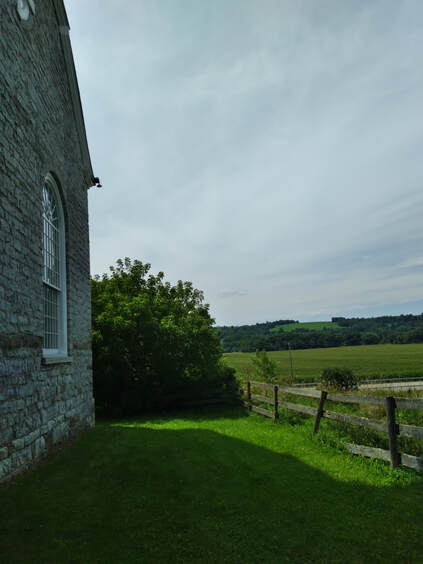 Jesus didn’t have Balance or Boundaries, yet he Embraced Inefficiency I can’t help but tell you a little bit about Jesus. I am certain he didn’t drive a 1931 Ford. Yet the one mode of transportation besides his feet he did take-- a colt or donkey depending on which Gospel you read--was pretty inefficient. It might have been faster to walk into Jerusalem on Palm Sunday instead of ride. Just like today, Jesus lived in an utterly out of balance, topsy-turvy world. There wasn’t a worldwide pandemic, but there was massive social unrest and upheaval. Jesus’ community was living under Roman occupation and the Jewish social order was thrown into chaos. Prophets, like Jesus, were to be found everywhere in ancient Palestine, calling for reform. To complicate matters, Jesus not only was calling for reform and a new social order, like many of the prophets of his day, he was also ministering individually to people. He walked the countryside, stopping in small villages to care for the many who sought his healing. Slow. Inefficient. Healing. He could barely move from one place to the next without crowds surrounding him. In one village a paraplegic was lowered through the roof since there was no other way to reach Jesus (Mark 2). In another town, a hemorrhaging woman had to reach through the crowd pressed in around her just to touch Jesus’ cloak in hopes of being healed (Luke 8). Jesus was utterly present to those around him. He encountered them as they were, in their communities, in the very space of their suffering and beauty, and he spoke hope and offered healing. He delivered his message on the slow and inefficient road to Jerusalem where his message must be spoken if he hoped to change any larger social order. This fully present meandering left Jesus exhausted. He hadn’t heard yet of our 21st century therapeutic buzz word: boundaries. He only knew that in each moment he was to care for those he met. And he didn’t have a 1931 Ford in which to flee, so he often found a boat and sailed out to the middle of the Galilee to escape the crowds (Matthew 8, 14,15). Jesus could not transcend the pressing needs of the time in which he lived nor the real demands of the people he met. If he had been efficient and boundaried, his ministry would have never changed the lives of so many. But due to his reckless, inefficient love, his stories were told long after his death, passed from generation to generation, until they transformed our world. And just like us, he could grow tired. He escaped, if only for a few hours, in a boat. Somehow, we must rebel against efficiency and carve out time for ourselves. On most days, I have no idea how to do this. Nor do I know how to sustain this effort. But I know, even if for moments, we must. Perhaps instead of emptying the dishwasher in the last few minutes before I leave for work, I can sit down and drink coffee and breathe. Perhaps we can escape, even if only for an hour, in our own equivalent of a boat. God designed the universe for a sabbath, and took one herself. We should too. For now, Jon Paul and I plan on taking another trip in Ellie. Our current plan: the Hudson River Valley. Stay tuned. 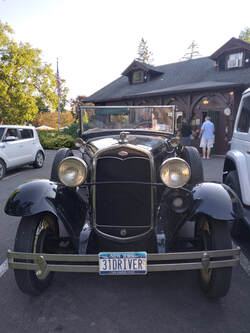
0 Comments
|
Categories |
 RSS Feed
RSS Feed